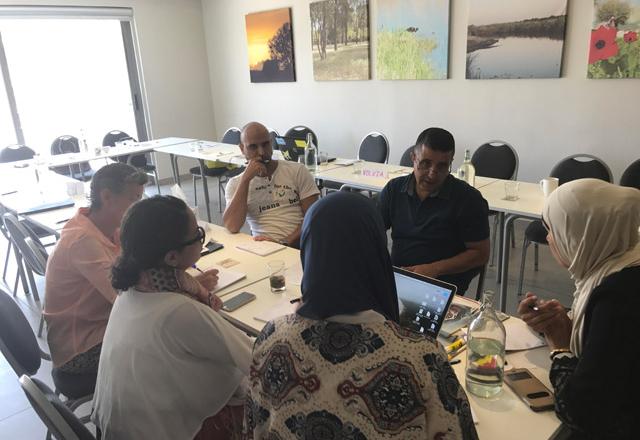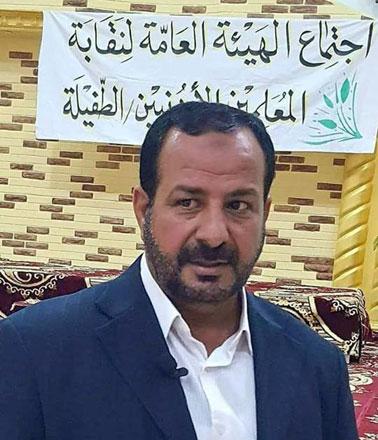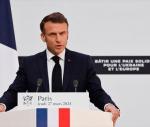You are here
Global exchange programme connects Moroccan, Jordanian, American students and educators
By Suzanna Goussous - Jul 24,2017 - Last updated at Jul 24,2017

Teachers from Jordan, Morocco and the US work together in an exchange programme to promote global citizenship, empathy and action-oriented projects (Photo by Suzanna Goussous)
AMMAN — Teachers from Jordan, Morocco and the US have been working together in an exchange programme to promote global citizenship, empathy and action-oriented projects, programme organisers said on Friday.
The “Campfire” exchange programme, launched around four years ago by the Global Nomads Group (GNG), has brought educators from the three countries together to work towards finding solutions to problems in the educational systems.
Christine Goussous, a community associate at GNG, said the project connects teachers to talk about the exchange programme and approaches, which can be taken to improve education in their home countries.
“Despite the lack of resources at many educational institutions in these countries, teachers are working towards achieving a better environment for students with the resources at hand,” she said.
Nicole Goggin, a programme manager at GNG in New York City, said the programme focuses on connecting classrooms from the MENA region and the US, and pairing educators to work on a common curriculum for students.
“We’ve learned that, throughout the students engaging with one another, they find a lot of similarities… They talk about really intimate issues; it ranges from recycling, health programmes and sometimes about poverty, or the fact that some students don’t have equal opportunities towards education,” she said.
The curriculum encourages them to share information about their experience and their community. Starting with the initial thoughts on the other country, it goes on to tackle the way the media portray its people, and what is missing in their countries, which leads to “mutual understanding and various perspectives on the same issue”, she added.
Jill Armstrong, an American social studies educator from Kentucky, said the programme introduces students from various backgrounds and countries to students their age who live in another country by learning that some of their challenges are similar.
“[The programme] is making the education world seem a little smaller… [It shows] that we are not there all alone… To be able to go back to my students and take back some of the things I saw here, my students will grab onto that,” she added.
“The challenge is to raise global awareness and say: things impact the world; you need to understand that, just because it didn’t happen here, it doesn’t mean that it’s not happening or that it’s not going to affect you,” Armstrong told The Jordan Times.
“Knowledge is power, you don’t have to agree or like what is being said, but it’s an understanding, you have to listen, it’s about coming together, discussing and learning – to be aware,” the educator noted.
Nolvia Delgado, director of partnerships at Cypress Hills Local Development Corporation, said exchanging provides skills and experience.
“I think an exchange like this gives students the opportunity to interact, to learn from each other, it’s one thing for them to read from a book, but, for them to talk to other students, it brings them together and that’s the only way to understand other people,” she said.
Launched in the name of J. Christopher Stevens, former US ambassador to Libya, the programme is funded by Stevens Initiative and aims at building bridges between the MENA region and the US, to understand and to talk, Danah Dajani, regional manager of Stevens Initiative said.
Stevens was killed by extremists in Libya in September 2012, yet the initiative continues to support projects aimed at overcoming barriers, Dajani added.
The initiative aims at connecting young people in the MENA and the US via virtual communication through different programmes.
“We believe virtual exchange is a powerful tool to provide the exposure needed,” she told The Jordan Times, adding: “When you see the energy of educators here and what they will take back to their students and continue with it, it’s very important.”
Huda Hajaya, a Jordanian teacher at Al Sultan Public High School in Karak Governorate, said the opportunity has an effect on several levels, including the historical and cultural ones.
“I used to feel that the local community in Karak didn’t want to accept other people and know about other countries, but, after implementing this project, my idea changed, they discovered more mutual issues; it was an enriching experience,” Hajaya said.
Fahmi Madani, secretary general of the Moroccan Association of Teachers of English, said the programme aims at fostering understanding and dialogue between students all over the world.
“To live in a peaceful world, we have to understand the cultures of other people and others should too,” Madani told The Jordan Times.
“Sometimes, conflicts come from the lack of understanding of others, if we focus on similarities rather than differences, that we are all human beings in one global village, we can lead this world to a better environment in the near future,” he added.
Muna Abu Hammour, of the Madrasati Initiative, said the partnership has reflected positively on students in schools, as they started researching their own and others’ cultures, debating and working together in teams.
Related Articles
From a small classroom in Mahatta Community Centre in Amman, Syrian students were able to speak to US counterparts this week about their country, and their fears and hopes in refuge.
AMMAN — The newly-elected head of the Jordan Teachers Association (JTA) Ahmad Hajaya said the syndicate will work with all stakeholders on s
AMMAN — Six years since the start of the war in Syria and the refugee crisis, one non-profit organisation plans to gather 45 youth ambassado


















